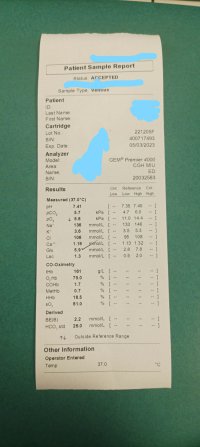Callmestar
Member
- Joined
- Apr 3, 2019
- Messages
- 647
I've been away from the forum for a while but I can't say my health has improved much. I've posted previously about my ongoing issue of thirst, frequent clear urination and dehydration which I won't bore everyone with again but if interested I posted about it here: Chronic health problem (Dehydration) - Faint hope somebody here might have some ideas
Anyway, I recently saw a consultant who currently specialises in M.E./CFS but used to work with renal patients and he seems to think based on my symptoms I have Renal Tubular Acidosis. I'm unsure if he's right or not. It seems possible but the specifics of the symptoms seem somewhat vague.
My eGFR and my electrolyte bloods are normal but my creatinine and uric acid have often been slightly elevated and above normal range. I also had an anion gap blood test once and that was also slightly high which can indicate acidosis.
Pretty much all other obvious causes for my ongoing frequent urination and thirst have been excluded so perhaps it could be this Renal Tubular Acidosis? I do wonder how/why I would have suddenly developed such an issue literally overnight. Also wondering what I can do about it if does end up being the correct diagnosis. I am waiting for the consultant to come back to me re renal testing for this condition.
Outside of this, I've been on Thyroid T3 for about 6 months and B12 injections for about 4 months. These seem to have taken me up a level to where I'm not feeling like I'm literally dying and practically bed bound but they haven't touched the dehydration issue. I expect whatever has been going on with the dehydration has caused hypothyroid, b12 deficiency and various other issues I'm patching up, but I am yet to find a solution for the underpinning issue of this unbearable thirst and constant fluid loss.
If anyone knows anything about Renal Tubular Acidosis or perhaps acidosis in general, I'd appreciate your thoughts.
Anyway, I recently saw a consultant who currently specialises in M.E./CFS but used to work with renal patients and he seems to think based on my symptoms I have Renal Tubular Acidosis. I'm unsure if he's right or not. It seems possible but the specifics of the symptoms seem somewhat vague.
My eGFR and my electrolyte bloods are normal but my creatinine and uric acid have often been slightly elevated and above normal range. I also had an anion gap blood test once and that was also slightly high which can indicate acidosis.
Pretty much all other obvious causes for my ongoing frequent urination and thirst have been excluded so perhaps it could be this Renal Tubular Acidosis? I do wonder how/why I would have suddenly developed such an issue literally overnight. Also wondering what I can do about it if does end up being the correct diagnosis. I am waiting for the consultant to come back to me re renal testing for this condition.
Outside of this, I've been on Thyroid T3 for about 6 months and B12 injections for about 4 months. These seem to have taken me up a level to where I'm not feeling like I'm literally dying and practically bed bound but they haven't touched the dehydration issue. I expect whatever has been going on with the dehydration has caused hypothyroid, b12 deficiency and various other issues I'm patching up, but I am yet to find a solution for the underpinning issue of this unbearable thirst and constant fluid loss.
If anyone knows anything about Renal Tubular Acidosis or perhaps acidosis in general, I'd appreciate your thoughts.


